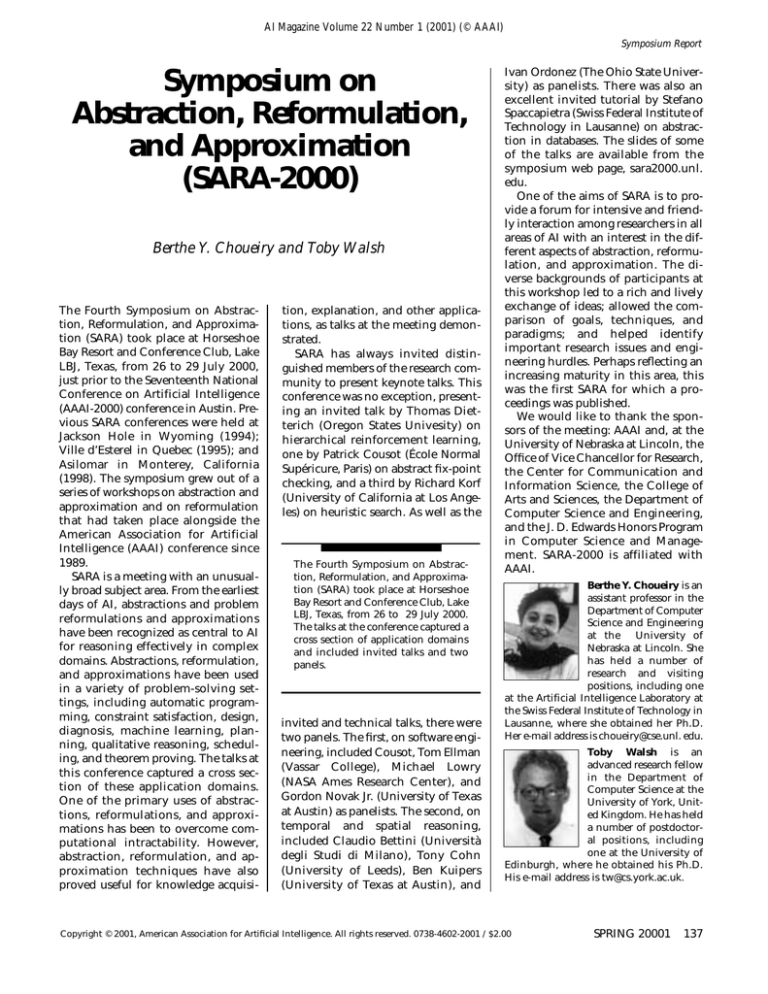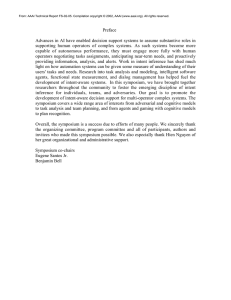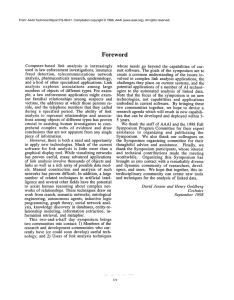
AI Magazine Volume 22 Number 1 (2001) (© AAAI)
Symposium Report
Symposium on
Abstraction, Reformulation,
and Approximation
(SARA-2000)
Berthe Y. Choueiry and Toby Walsh
The Fourth Symposium on Abstraction, Reformulation, and Approximation (SARA) took place at Horseshoe
Bay Resort and Conference Club, Lake
LBJ, Texas, from 26 to 29 July 2000,
just prior to the Seventeenth National
Conference on Artificial Intelligence
(AAAI-2000) conference in Austin. Previous SARA conferences were held at
Jackson Hole in Wyoming (1994);
Ville d’Esterel in Quebec (1995); and
Asilomar in Monterey, California
(1998). The symposium grew out of a
series of workshops on abstraction and
approximation and on reformulation
that had taken place alongside the
American Association for Artificial
Intelligence (AAAI) conference since
1989.
SARA is a meeting with an unusually broad subject area. From the earliest
days of AI, abstractions and problem
reformulations and approximations
have been recognized as central to AI
for reasoning effectively in complex
domains. Abstractions, reformulation,
and approximations have been used
in a variety of problem-solving settings, including automatic programming, constraint satisfaction, design,
diagnosis, machine learning, planning, qualitative reasoning, scheduling, and theorem proving. The talks at
this conference captured a cross section of these application domains.
One of the primary uses of abstractions, reformulations, and approximations has been to overcome computational intractability. However,
abstraction, reformulation, and approximation techniques have also
proved useful for knowledge acquisi-
tion, explanation, and other applications, as talks at the meeting demonstrated.
SARA has always invited distinguished members of the research community to present keynote talks. This
conference was no exception, presenting an invited talk by Thomas Dietterich (Oregon States Univesity) on
hierarchical reinforcement learning,
one by Patrick Cousot (École Normal
Supéricure, Paris) on abstract fix-point
checking, and a third by Richard Korf
(University of California at Los Angeles) on heuristic search. As well as the
The Fourth Symposium on Abstraction, Reformulation, and Approximation (SARA) took place at Horseshoe
Bay Resort and Conference Club, Lake
LBJ, Texas, from 26 to 29 July 2000.
The talks at the conference captured a
cross section of application domains
and included invited talks and two
panels.
invited and technical talks, there were
two panels. The first, on software engineering, included Cousot, Tom Ellman
(Vassar College), Michael Lowry
(NASA Ames Research Center), and
Gordon Novak Jr. (University of Texas
at Austin) as panelists. The second, on
temporal and spatial reasoning,
included Claudio Bettini (Università
degli Studi di Milano), Tony Cohn
(University of Leeds), Ben Kuipers
(University of Texas at Austin), and
Ivan Ordonez (The Ohio State University) as panelists. There was also an
excellent invited tutorial by Stefano
Spaccapietra (Swiss Federal Institute of
Technology in Lausanne) on abstraction in databases. The slides of some
of the talks are available from the
symposium web page, sara2000.unl.
edu.
One of the aims of SARA is to provide a forum for intensive and friendly interaction among researchers in all
areas of AI with an interest in the different aspects of abstraction, reformulation, and approximation. The diverse backgrounds of participants at
this workshop led to a rich and lively
exchange of ideas; allowed the comparison of goals, techniques, and
paradigms; and helped identify
important research issues and engineering hurdles. Perhaps reflecting an
increasing maturity in this area, this
was the first SARA for which a proceedings was published.
We would like to thank the sponsors of the meeting: AAAI and, at the
University of Nebraska at Lincoln, the
Office of Vice Chancellor for Research,
the Center for Communication and
Information Science, the College of
Arts and Sciences, the Department of
Computer Science and Engineering,
and the J. D. Edwards Honors Program
in Computer Science and Management. SARA-2000 is affiliated with
AAAI.
Berthe Y. Choueiry is an
assistant professor in the
Department of Computer
Science and Engineering
at the
University of
Nebraska at Lincoln. She
has held a number of
research and visiting
positions, including one
at the Artificial Intelligence Laboratory at
the Swiss Federal Institute of Technology in
Lausanne, where she obtained her Ph.D.
Her e-mail address is choueiry@cse.unl. edu.
Toby Walsh is an
advanced research fellow
in the Department of
Computer Science at the
University of York, United Kingdom. He has held
a number of postdoctoral positions, including
one at the University of
Edinburgh, where he obtained his Ph.D.
His e-mail address is tw@cs.york.ac.uk.
Copyright © 2001, American Association for Artificial Intelligence. All rights reserved. 0738-4602-2001 / $2.00
SPRING 20001
137
Call for Proposals:
2002 Spring Symposium Series
AAAI invites proposals for the 2002 Spring Symposium Series, to be
held March 25-27, 2002 at Stanford University, California.
The Spring Symposium Series is an annual set of meetings run in
parallel at a common site. It is designed to bring colleagues together in
an intimate forum while at the same time providing a significant gathering point for the AI community. The two and a half day format of
the series allows participants to devote considerably more time to feedback and discussion than typical one-day workshops. It is an ideal
venue for bringing together new communities in emerging fields.
The symposia are intended to encourage presentation of speculative
work and work in progress, as well as completed work. Ample time
should be scheduled for discussion. Novel programming, including the
use of target problems, open-format panels, working groups, or breakout sessions, is encouraged. Working notes will be prepared, and distributed to the participants. At the discretion of the individual symposium chairs, these working notes may also be made available as AAAI
Technical Reports following the meeting. Most participants of the symposia will be selected on the basis of statements of interest or abstracts
submitted to the symposia chairs; some open registration will be
allowed. All symposia are limited in size, and participants will be
expected to attend a single symposium.
Proposals for symposia should be between two and five pages in
length, and should contain:
■ A title for the symposium.
■ A description of the symposium, identifying specific areas of interest, and, optionally, general symposium format.
■ The names and (physical and electronic) addresses of the organizing committee preferably three or more people at different sites, all
of whom have agreed to serve on the committee.
■ A list of potential participants that have been contacted and that
have expressed interest in participating. A common way of gathering potential participants is to send email messages to email lists
related to the topic(s) of the symposium. Note that potential participants need not commit to participating, only state that they are
interested.
Ideally, the entire organizing committee should collaborate in producing the proposal. If possible, a draft proposal should be sent out to a few
of the potential participants and their comments solicited.
Approximately eight symposia on a broad range of topics within and
around AI will be selected for the 2002 Spring Symposium Series. All
proposals will be reviewed by the AAAI Symposium Committee,
chaired by Dan Clancy, NASA Ames Research Center. The criteria for
acceptance of proposals include:
Perceived interest to the AAAI community. Although AAAI encourages
symposia that cross disciplinary boundaries, a symposium must be of
interest to some subcommunity of the AAAI membership. Symposia
that are of interest to a broad range of AAAI members are also preferred.
138
AI MAGAZINE
Appropriate number of potential participants. Although the series supports a range of symposium sizes, the target size is around 40-60 participants.
Lack of a long-term ongoing series of activities on the topic. The Spring
Symposium Series is intended to nurture emerging communities and
topics, so topics that already have yearly conferences or workshops are
inappropriate.
An appropriate organizing committee. The organizing committee
should have (1) good technical knowledge of the topic, (2) good organizational skills, and (3) connections to the various communities from
which they intend to draw participants. Committees for cross-disciplinary symposia must adequately represent all the disciplines to be
covered by the symposium.
Accepted proposals will be distributed as widely as possible over the
subfields of AI, and balanced between theoretical and applied topics.
Symposia bridging theory and practice and those combining AI and
related fields are particularly solicited.
Symposium proposals should be submitted as soon as possible, but
no later than April 23, 2001. Proposals that are submitted significantly
before this deadline can be in draft form. Comments on how to
improve and complete the proposal will be returned to the submitter
in time for revisions to be made before the deadline. Notifications of
acceptance or rejection will be sent to submitters around May 7, 2001.
The submitters of accepted proposals will become the chair of the symposium, unless alternative arrangements are made. The symposium
organizing committees will be responsible for:
■ Producing, in conjunction with the general chair, a Call for Participation and Registration Brochure for the symposium, which will
be distributed to the AAAI membership
■ Additional publicity of the symposium, especially to potential
audiences from outside the AAAI community
■ Reviewing requests to participate in the symposium and determining symposium participants
■ Preparing working notes for the symposium
■ Scheduling the activities of the symposium
■ Preparing a short review of the symposium, to be printed in AI
Magazine.
AAAI will provide logistical support, will take care of all local
arrangements, and will arrange for reproducing and distributing the
working notes. Please submit (preferably by electronic mail) your symposium proposals, and inquiries concerning symposia, to:
Daniel J. Clancy
AAAI Symposium Chair
NASA Ames Research Center, MS 269
Moffett Field, 94035-0001
dclancy@arc.nasa.gov
Voice: 650-604-2257
Fax: 650-604-4036




